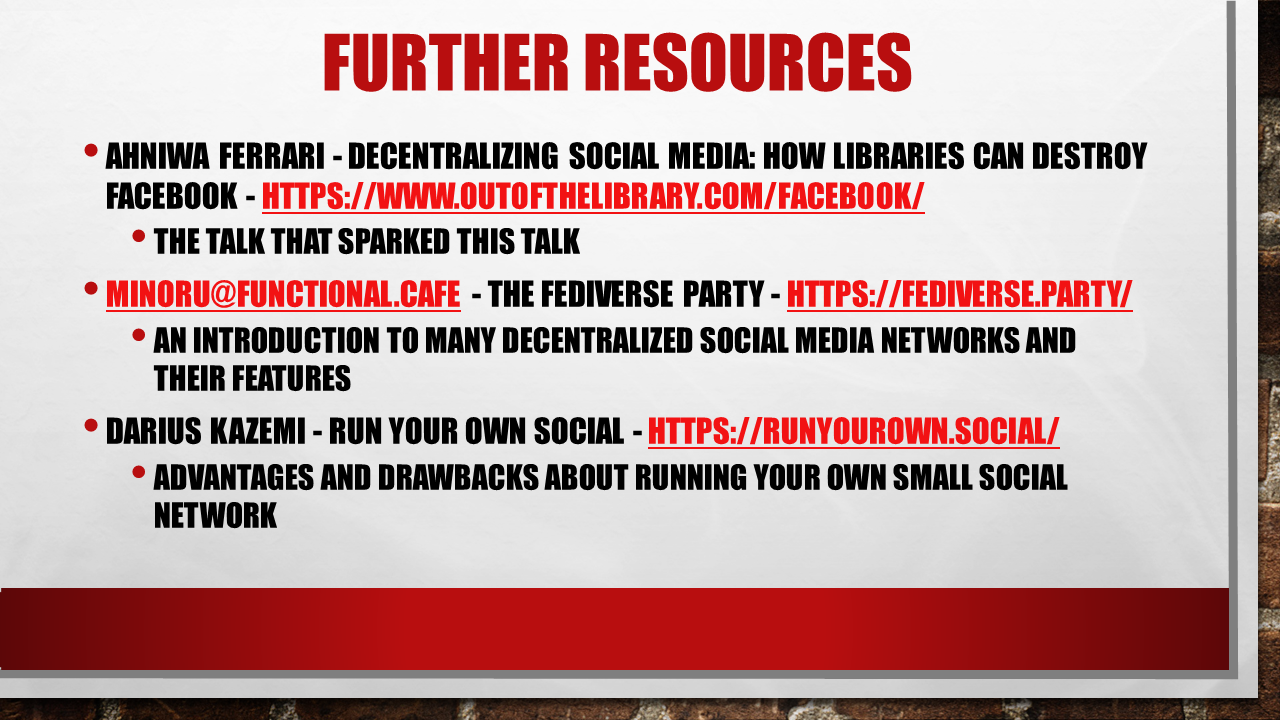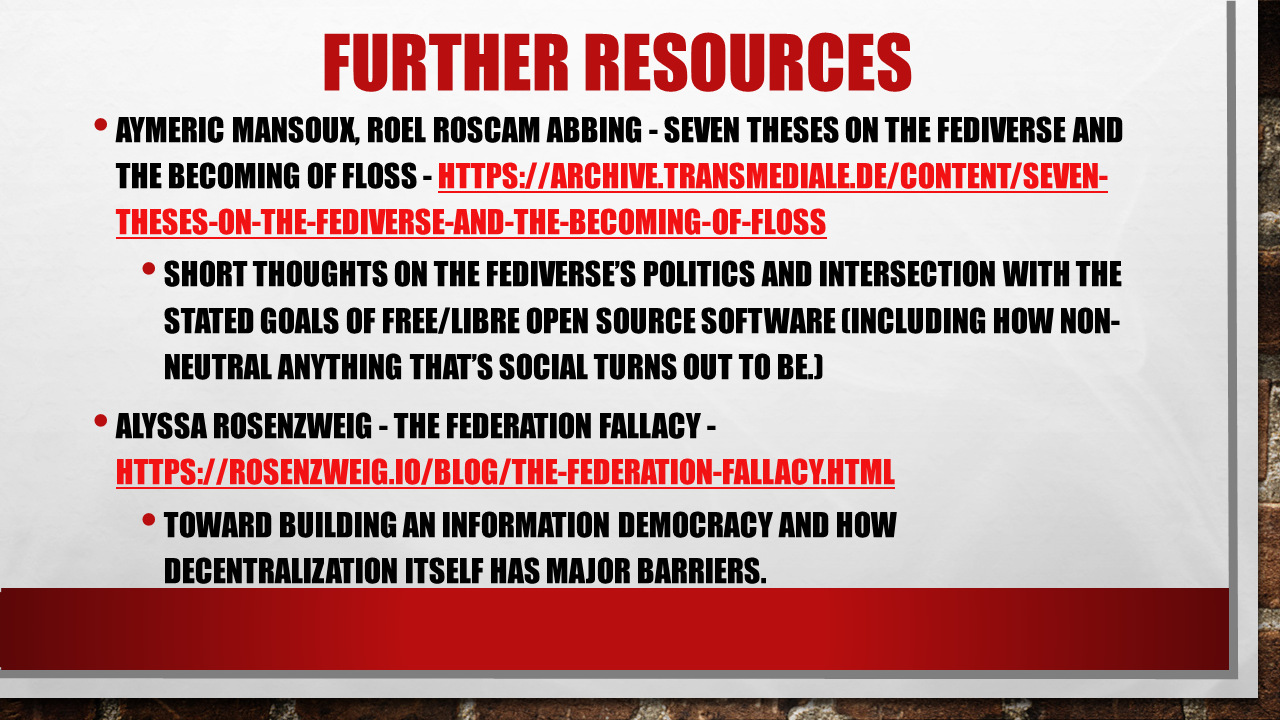
This presentation was inspired by a lightning talk by Aniwha Ferrari, Decentralizing Social Media: How Libraries Can Destroy Facebook, which is an introduction to the idea of the Fediverse and some of the potential benefits to not using centralized, corporatized social media. I'm hoping that some other enterprising person will take these ideas and put them into practice, and then come back with a report about how well things worked and didn't, so that we have a better idea of how to try again that will make it less stressful, less taxing, and more doable.
An excellent overview of some of the more popular Fediverse services (and what they're alternatives to) is handled by Fediverse.party, collectively maintained by several administrators. It doesn't cover some of the newer frontiers of decentralized, federated social media services, but it's a good overview of many of the programs that can communicate with each other using shared protocols (some of which can have plugins installed so that they can communicate across a greater swath of the Fediverse.) The overview here really helped conceptualize what might be possible, and which services to recommend to librarians as being potentially low-cost and low-bandwidth, rather than suggesting they set up a PeerTube instance and start trafficking in video content created by their people.
Many of the benefits and drawbacks to standing up your own instance follow the idea of Darius Kazemi, who maintains both a social network (Friend Camp) and the customized version of Mastodon that Friend Camp runs on (Hometown). Darius believes in people who want to run their own social media sites running small (100 people or less) social networks for themselves and their friends and then letting those friends make bigger connections to other social sites through federation connections. By keeping instances small, many of the moderation questions that happen for larger instances don't come up (because you're not trying to make a decision that some amount of 10,000 accounts are going to agree with), and many of the costs and problems that come from trying to host an instance of 10,000 don't come up, either. Plus, all the benefits of having a small community that generally gets along with each other. Libraries that successfully run their own socials might use this concept to start breaking out their socials into smaller groups and delegating moderation power to the people that want to step up and run them, or that would allow for staff to select which instances they're interested in taking a moderation hand with, and who they want to let in to their specific local instances. It would be an interesting transition to go from host and admins of platforms to providers of spaces for people to set up their own small social networks and make decisions about who they want to tinvite in, lowering the technical and content costs by using the library's already-in-place infrastructure. (It's where I'd love for this idea of library social media services to go, honestly.)

On the matter of content moderation and the way that tools often do not have an inherent morality of their own, Aymeric Mansoux and Roel Roscam Abbing published "Seven Theses on The Fediverse and the Becoming of FLOSS", (FLOSS meaning "Free/Libre Open Source Software", programs that are offered with the source code also available without cost for others to use and modify and often in forms that can just be run without monetary charge, often with licensing requirements that say any modified programs must also have their source code available without charge) a set of ideas about how the Fediverse and the tools that undergird the Fediverse are going through questions about whether or not they are allowed to impose morality or conscience on the Fediverse and its tools, because there are other aspects of the Fediverse that espouse ideas and philosophies anathema to their own. As libraries continue to struggle through making decisions about "neutrality" and "intellectual freedom" that have historically privileged white supremacy and its underlying ideals, so are at least some parts of the FLOSS space trying to wrestle with the idea of whether it's a betrayal of FLOSS ideas to put restrictions and prohibitions on who can use tools and what they can be used for. Because, after all, the same tools that create social justice-oriented spaces and safe spaces can also be used to create spaces whose most socially-acceptable content are "dank memes" and overt promotion of fascism and fascist candidates. And for most of these tools, there are no built-in lists of who to exclude or places to avoid for those who are just getting set up. (At least one of the stories is about the Discourse over an app creator hard-coding a list of services and places it refused to connect to through the app.) Some tools themselves are beginning to get a reputation for being used by people with specific political views, such that a person looking to set up their own social might find themselves having to work harder to make social connections because they chose a particular tool based on resource requirements without knowing choosing that tool gave them a reputation, warranted or otherwise.
And, for discussion purposes, Alyssa Rosenzweig offers "The Federation Fallacy", which suggests that federation is not the way to break the control of corporations over social media, because the barriers to entry and maintenance of your own social media site are too large for the average person to want to deal with. Instead, Rosenweig argues that our best hope is to find the nascent centralizing spots (like the Mastodon instance at mastodon.social) and convince them that they should be governed by democratic processes to produce an information democracy, charting a middle path between the dictatorships (benevolent or otherwise) that result from centralization and the anarchy that results when everyone is expected to run their own units. (Successes of information democracy cited are Mastodon, even though it centralized, and Wikipedia, at least when Wikipedia is running on its ideals.)
If Rosenzweig is right, and centralization is inevitable, then having an information democracy, as provided by a library, is still very preferable to the oligarchy of corporate interests and their desires to lock everyone else out for their own purposes of profit. So, even if most library social media spaces were to fail or exist in relative obscurity with few members, the ones that succeeded, if they start and worked with other democratic interfaces, could still present a useful alternative to the corporate oligarchies. Thus, even though it may not be small or simple once there's some thought put into it, I still think it's a good idea for libraries to explore running their own socials, or providing space for library users to run their own.